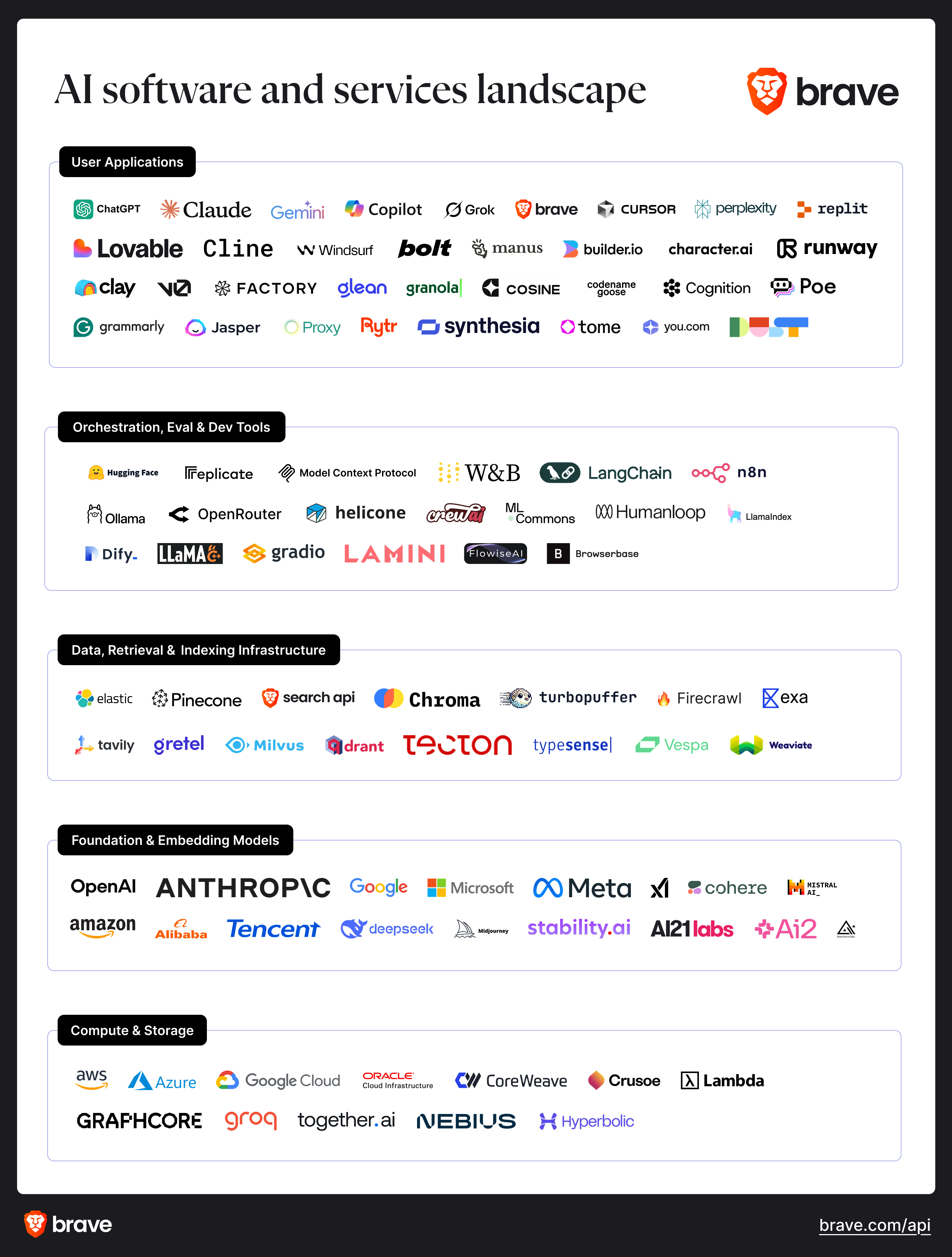Mapping the AI software and services landscape
OpenAI’s release of ChatGPT 3.5 was an inflection point for the broad adoption of generative artificial intelligence. Since then, there’s been an explosion of new AI business ventures from startups all the way to Big Tech, building across a wide range of vertical and horizontal markets. Today, Generative AI has already made its way into a significant share of the software we use day to day.
There are various ways to divide and categorize the sprawling AI market, but we chose a method that allowed for effective grouping based on the primary business function of each company. This article breaks down a view of some of the most important software and service brands that represent the fast-growing AI ecosystem.

Compute and storage
This category is the physical substrate on which all other levels run. AI workloads—training or inference for example—require a large amount of computational power and resources, beyond what most businesses can manage effectively alongside their primary services. The companies in this category service the AI landscape by operating hundreds of thousands of GPUs, TPUs (Google), specialized chips, and servers to run and host the other categories of the stack. This on-demand horsepower and warehousing enables businesses of all sizes to tap into computational power as needed to run their AI products and features.
Includes AWS, Microsoft Azure, Google Cloud, Oracle Cloud Infrastructure, Groq, Lambda, CoreWeave, Crusoe, Graphcore, Hyperbolic, Together AI, and Nebius.
Foundation and embedding models
These companies produce what we most commonly refer to as the AI models. They compress large amounts of language, image, code, and other multimodal data into programs that—when prompted—produce outputs that closely resemble human recall and reasoning, or intelligence. Their products are the center of today’s unfolding software revolution and are effectively the brains that give life to the intelligent user applications.
Includes OpenAI, Anthropic, Google, Microsoft, Mistral, Meta, Stability AI, xAI, Alibaba, Tencent, Cohere, Deepseek, Stability AI, Midjourney, Black Forest Labs, Ai2, and AI21labs.
Data, retrieval, and indexing infrastructure
Creating intelligent AI agents, whether general-purpose or specialized, public or private, requires access to high-quality and well-structured data. This group of companies play the role of creating, organizing, storing, and making available all types of data to both create and enhance foundational models. Models without data to ground them will lack the knowledge of anything that happened after their release date, are more likely to hallucinate, or be unable to answer their prompts effectively. Examples here include solutions that enable AI to search the Web or services that help with making enterprise data more usable to AI models.
Includes Elastic, Brave Search API, Pinecone, Turbopuffer, Chroma,Exa, Firecrawl, Gretel, Milvus, Qdrant, Tavily, Tecton, Typesense, Vespa, and Weaviate.
Orchestration, evaluation, and dev tools
AI agents, features, and applications tend to be complex systems that require a new and emerging class of tools. These companies primarily focus on developer products, such as evaluation and optimization of AI costs, low- and no-code platforms for AI orchestration, or frameworks for developing standardized AI–usable tools such as Anthropic’s Model Context Protocol (MCP).
Includes Hugging Face, Model Context Protocol, Ollama, LangChain, Weights & Biases, Browserbase, CrewAI, Dify, FlowiseAI, Gradio, Helicone, Humanloop, LLaMa.cpp, LlamaIndex, Lamini, ML Commons, n8n.io, OpenRouter, and Replicate.
User applications
Providers from all of the prior sections come together to deliver intelligent AI-powered products and services that aim to make work and personal life more productive. The most ubiquitous of these is ChatGPT, the general-purpose assistant from OpenAI that kicked off the revolution by introducing the world to a new way to do just about anything. What began as a handful of simple chat interfaces has quickly blossomed into an ecosystem of new and exciting products and services that change the way we search the Web, code, write, design, and more.
Includes ChatGPT, Google Gemini, Claude, Microsoft Copilot, Brave (Leo and Answers with AI), Perplexity, Grok, Cursor, Loveable, Bolt.ai, Poe, Builder.io, Character.ai, Clay, Cline, Codename Goose, Jasper, Manus, Proxy (Convergence.ai), Replit, Runway, Rytr, Synthesia, Tome, v0 (Vercel), Windsurf, Cognition, Cosine, Dust, Factory, Glean, Granola, Grammarly, and You.com.






